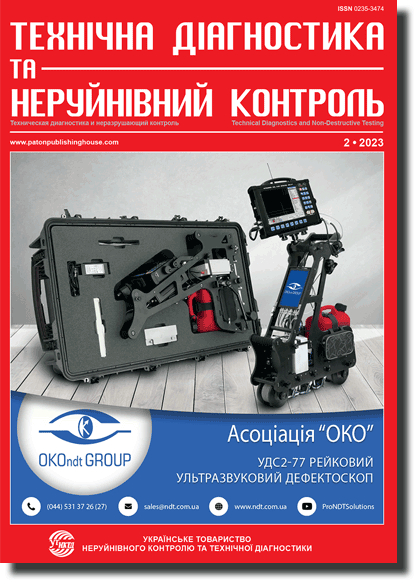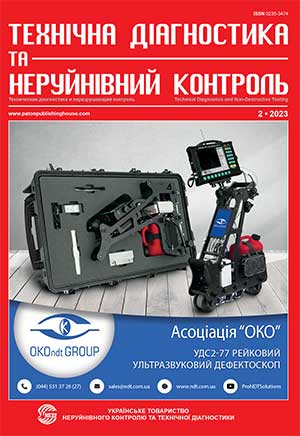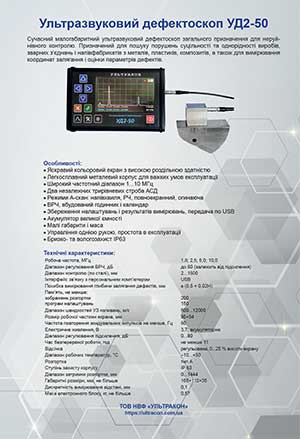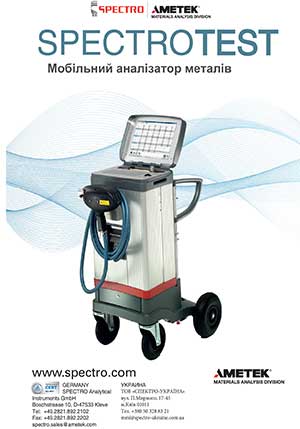| 2023 №02 (06) |
DOI of Article 10.37434/tdnk2023.02.01 |
2023 №02 (02) |
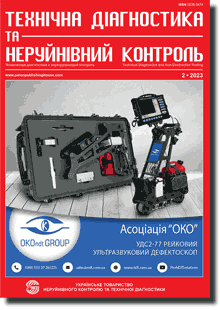
"Tekhnichna Diahnostyka ta Neruinivnyi Kontrol" (Technical Diagnostics and Non-Destructive Testing) #2, 2023, pp. 7-16
Automated EDDY current inspection systems with surface probe of double differential type
V.M. Uchanin1, G.G. Lutcenko2, A.V. Opanasenko2
1G.V. Karpenko Physico-Mechanical Institute of NASU. 5 Naukova str., 79060, Lviv, Ukraine. E-mail: vuchanin@gmail.com2Ukrainian Scientific Institute for Non-Destructive Testing. 8 Naberezhno-Lugova str., 04070, Kyiv, Ukraine. E-mail:office@ndt.com.ua
The prospects and state-of-the art related the development of automated non-destructive testing systems are considered. The formation of the tendency concerned with creation of the adaptive automated systems for complex testing based on the application of various physical principles to obtain a synergistic effect is indicated. The factors affecting the variability of eddy current probe signals during the manual and automated eddy current testing were analyzed. The advantages of selective probes of double differential type for automated systems development are indicated. Features of the design and characteristics of multichannel automated systems based on the eddy current method application developed in Ukraine are presented, in particular: a robotic eddy current testing system for detection and identifying of in-service defects in the tubes of secondary reforming furnaces; the eddy current unit of the multi-channel system of complex testing of railway axles during their production; automated system of complex testing of wheel pairs in the conditions of repair plants; eddy current block of the system for complex inspection of railway rails during their production. 30 Ref., 1 Tabl., 12 Fig.
Keywords: automated system, complex non-destructive testing, eddy current defectoscopy, eddy current probe of double differential type
Received: 04.02.2023
References
1. Meyendorf, N., Heilmann, P., Bond, L. at al. (2020) NDE 4.0 in Manufacturing: Challenges and Opportunities for NDE in the 21st Century. Materials Evaluation, 78(7), 794-803. https://doi.org/10.32548/2020.me-041442. Meyendorf, N., Ida, N., Singh, R., Vrana, J. (2021) Handbook of Nondestructive Evaluation 4.0. Springer, Cham. https://doi.org/10.1007/978-3-030-48200-8_43-1
3. Vajpayee, А., Russell, D. (2019) Inspection of Boiler Water Wall Tubes using Electromagnetic Inspection Technique. Yesterday (manual) and Today (automated). Industrial Eye, 6(5), 39-43.
4. Bridge, B., Sattar, T., Chen, S., Khalid, A. (1997) On the design of multi-task, compact, climbing robotic NDT systems for remote operation on large surfaces and in hazardous environments. Nondestructive Testing and Evaluation, 13(2), 85-111. https://doi.org/10.1080/02780899708953021
5. Bertovic, M. (2016) A Human Factors Perspective on the Use of Automated Aids in the Evaluation of NDT Data. Proc. 42nd annual conf. «Review of Progress in Quantitative Nondestructive Evaluation», AIP Conf. Proc., 1706, 020003, 1-16. https://doi.org/10.1063/1.4940449
6. Bertovic, M. (2015) Human Factors in Non-Destructive Testing (NDT): Risks and Challenges of Mechanised NDT, Doctoral dissertation, Technical University, Berlin.
7. Ornatsky, P.P. (1983) Theoretical fundamentals of information-measurement technique. Kyiv, Vyshcha Shkola [in Russian].
8. Babak, V.P., Babak, S.V., Ieremenko, V.S. et al. (2017) Theoretical fundamentals of information-measurement systems. Ed. by V.P. Babak, 2nd Ed. Kyiv, NAU [in Ukrainian].
9. Zashchepkina, N.M., Shulga, O.V., Nakonechnyi, O.A. (2021) Metrological support of information-measurement systems. Kyiv, KPI [in Ukrainian].
10. Parasuraman, R., Sheridan, T.B., Wickens, C.D. (2000) A Model for Types and Levels of Human Interaction with Automation. IEEE Transactions on systems, man, and cybernetics - Part A: Systems and humans, 30(3), 286-297. https://doi.org/10.1109/3468.844354
11. Le Liu (2018) The Process to Design an Automation System. Journal of Physics: Conference Series, 1087(4). https://doi.org/10.1088/1742-6596/1087/4/042001
12. Calhoun, G. (2022) Adaptable (Not Adaptive) Automation: Forefront of Human-Automation Teaming. Human factors, 64(2), 269-277. https://doi.org/10.1177/00187208211037457'); ?>
13. Bobukh, A.O. (2006) Automated systems of control of technological processes. Kharkiv, KhNAMG [in Ukrainian].
14. Gurvich, A.K., Shcherbinsky, V.G. (2006) Automated NDT of metal products. V Mire Nerazrushayushchego Kontrolya, 3(33), 4-5 [in Russian].
15. Dolinenko,V., Shapovalov, E., Skuba, T. et al. (2017) Robotic system of non-destructive eddy-current testing of complex geometry products. The Paton Welding J., 5-6, 51-57. https://doi.org/10.15407/as2017.06.10
16. Koshovyy, V.V., Nazarchuk, Z.T. (2001) Estimating the Predefective State of a Material Using Methods of Ultrasonic Computerized Tomography. Materials Science, 37(2), 279- 293. https://doi.org/10.1023/A:1013219011254
17. Vertiy, O., Uchanin, V. (2021) Three-dimensional visualization of the detected defects by eddy current computing tomography. The Paton Welding J., 9, 49-55. https://doi.org/10.37434/tpwj2021.09.08
18. Tamburrino, A., Rubinacci, G. (2006) Fast methods for quantitative eddy-current tomography of conductive materials. IEEE Transactions on Magnetics, 42(8), 2017-2028. https://doi.org/10.1109/TMAG.2006.877542
19. Thomas, H.M., Heckel, T., Hanspach, G. (2006) Advantage of a combined Ultrasonic and Eddy Current Examination for Railway Inspection Trains. 9th Europ. Conf. on Nondestructive Testing, Berlin, www. ndt.com.
20. Rockstroh, B., Kappes, W., Walte, F. (2008) Ultrasonic and EddyCurrent Inspection of Rail Wheels and Wheel Set Axles. 17th World Conf. on Nondestructive Testing, Shanghai, www.ndt.com.
21. Libby, H.L. (1971) Introduction to Electromagnetic Nondestructive Test Methods. Wiley-Interscience New York.
22. Teterko, A.Ya., Nazarchuk, Z.T. (2004) Selective eddy current flaw detection. Lviv, PMI [in Ukrainian].
23. García-Martín, J., Gómez-Gil, J., Vázquez-Sánchez, E. (2011) Non-destructive techniques based on eddy current testing, Sensors, 11, 2525-2565. https://doi.org/10.3390/s110302525
24. Uchanin, V.M. (2023) Surface eddy current probes of double differential type as an effective tool to solve non-destructive inspection problems. The Paton Welding J., 2, 46-55. https://doi.org/10.37434/tpwj2023.02.07
25. Uchanin, V., Lutcenko, G., Nikonenko, A. (2006) Automated Eddy Current System for Flaw Detection and Sizing during In-service Stainless S teel Tube Inspection. Proc. 9th Europ. Conf. on Nondestructive Testing, Berlin, www.ndt.net.
26. Uchanin, V., Lutcenko, G. et al. (2010) The system of automated complex testing of rail axles in their manufacture. Proc. 10th Europ. Conf. on Nondestructive Testing, Moscow, www. ndt.net.
27. Lutcenko, G., Uchanin, V., Mischenko, V., Opanasenko A. (2012) Eddy Currents Versus Magnetic Particles. Proc. 18th World Conf. on Nondestructive Testing, Durban, www.ndt.com.
28. Raj, M., Mallik, D., Bansal, S. et al. (2012) Non-Destructive Testing and Inspection of Rails at JSPL - Ensuring Safety and Reliability. Proc. 18th World Conf. on Nondestructive Testing, Durban, www.ndt.net.
29. Song, Z., Yamada, T., Shitara, H., Takemura, Y. (2011) Detection of Damage and Crack in Railhead by Using Eddy Current Testing. J. of Electromagnetic Analysis and Applications, 3(12), 546-550. https://doi.org/10.4236/jemaa.2011.312082
30. Opanasenko, A., Iurchenko, A., Lutcenko, G., Uchanin, V. (2016) Eddy Current Multi-Channel Мodule for In-line High-speed Inspection of Railroad Rails. 19th World Conf. on Nondestructive Testing, Munich, www.ndt.net.
Advertising in this issue:
The cost of subscription/purchase order journals or individual articles
| Journal/Currency | Annual Set | 1 issue printed |
1 issue |
one article |
| TPWJ/USD | 384 $ | 32 $ | 26 $ | 13 $ |
| TPWJ/EUR | 348 € | 29 € | 24 € | 12 € |
| TPWJ/UAH | 7200 UAH | 600 UAH | 600 UAH | 280 UAH |
| AS/UAH | 1800 UAH | 300 UAH | 300 UAH | 150 UAH |
| AS/USD | 192 $ | 32 $ | 26 $ | 13 $ |
| AS/EUR | 180 € | 30 € | 25 € | 12 € |
| SEM/UAH | 1200 UAH | 300 UAH | 300 UAH | 150 UAH |
| SEM/USD | 128 $ | 32 $ | 26 $ | 13 $ |
| SEM/EUR | 120 € | 30 € | 25 € | 12 € |
| TDNK/UAH | 1200 UAH | 300 UAH | 300 UAH | 150 UAH |
| TDNK/USD | 128 $ | 32 $ | 26 $ | 13 $ |
| TDNK/EUR | 120 € | 30 € | 25 € | 15 € |
AS = «Automatic Welding» - 6 issues per year;
TPWJ = «PATON WELDING JOURNAL» - 12 issues per year;
SEM = «Electrometallurgy Today» - 4 issues per year;
TDNK = «Technical Diagnostics and Non-Destructive Testing» - 4 issues per year.





